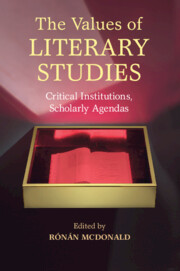Book contents
- Frontmatter
- Contents
- Notes on Contributors
- Acknowledgments
- Introduction
- 1 The Value of Criticism and the Project of Modernism
- 2 Caprice: Individual Subjectivity in Literary Criticism
- 3 The Phenomenology of Literary Valuation
- 4 Literature Is History: Aesthetic Time and the Ethics of Literary Will
- 5 Dead on Arrival: Time and the Value of Old Books
- 6 The Price of Value
- 7 To Shelter the Nothing That Happens
- 8 When Literary Criticism Mattered
- 9 Literature among the Objects of Modernist Criticism: Value, Medium, Genre
- 10 “Vale!” : Psychoanalysis, Value, and Literature
- 11 Afterlives of Comparison: Literature, Equivalence, Value
- 12 Feminism, Gender, and the Literary Commons
- 13 The Value of World Making in Global Literary Studies
- 14 Multiple Versions and Fictional Minds: Manuscript Research, Digital Editing, and Enactive Cognition in Literary Studies
- 15 After Suspicion: Surface, Method, Value
- 16 Literary Experience and the Value of Criticism
- Index
1 - The Value of Criticism and the Project of Modernism
Published online by Cambridge University Press: 05 November 2015
- Frontmatter
- Contents
- Notes on Contributors
- Acknowledgments
- Introduction
- 1 The Value of Criticism and the Project of Modernism
- 2 Caprice: Individual Subjectivity in Literary Criticism
- 3 The Phenomenology of Literary Valuation
- 4 Literature Is History: Aesthetic Time and the Ethics of Literary Will
- 5 Dead on Arrival: Time and the Value of Old Books
- 6 The Price of Value
- 7 To Shelter the Nothing That Happens
- 8 When Literary Criticism Mattered
- 9 Literature among the Objects of Modernist Criticism: Value, Medium, Genre
- 10 “Vale!” : Psychoanalysis, Value, and Literature
- 11 Afterlives of Comparison: Literature, Equivalence, Value
- 12 Feminism, Gender, and the Literary Commons
- 13 The Value of World Making in Global Literary Studies
- 14 Multiple Versions and Fictional Minds: Manuscript Research, Digital Editing, and Enactive Cognition in Literary Studies
- 15 After Suspicion: Surface, Method, Value
- 16 Literary Experience and the Value of Criticism
- Index
Summary
The peculiar species of literary studies that we call “literary criticism” might seem to have become a hopeless enterprise. Increasingly averse to unhedged affirmations, at least where judgments of value are concerned, the field has allowed its role gradually to be obscured by preoccupations that can distract from something quite fundamental: the critical value of literature. That is hardly surprising, not least because questions of value have largely been sidelined, or perhaps more commonly “trumped” by claims that value is essentially a mask for various species of power and for forces operating at some deeper level, none of which is formed as particularly “literary” in any way. Add to this the fact that “literature” has been ever more broadly defined, no less in the formal possibilities that it encompasses than in the national and ethnic traditions that it includes, and it is even less surprising that contemporary humanists have found it difficult if not impossible to articulate the value of literary criticism. How could one possibly assess the value of criticism when literature seems up for grabs?
Even in the best of circumstances the project of literary criticism presents challenges. Already in the sixteenth century Montaigne wrote that “It is more of a job to interpret the interpretations than to interpret the things, and there are more books about books than about any other subject: we do nothing but write glosses about each other. The world is swarming with commentaries; of authors there is a great scarcity.” There is, of course, considerable irony in what Montaigne wrote, because although he declared himself to be the central subject of the Essays (as he put it in the preface, addressed “To the Reader,” “I am myself the matter of my book,” 2) his writings are laced with citations from the works of others. And yet there is a notable difference between Montaigne's writing and the proliferating “interpretations” to which he refers, a difference that has mostly to do with his particular relationship to the texts and traditions that he incorporates in the Essays.
- Type
- Chapter
- Information
- The Values of Literary StudiesCritical Institutions, Scholarly Agendas, pp. 13 - 26Publisher: Cambridge University PressPrint publication year: 2015

